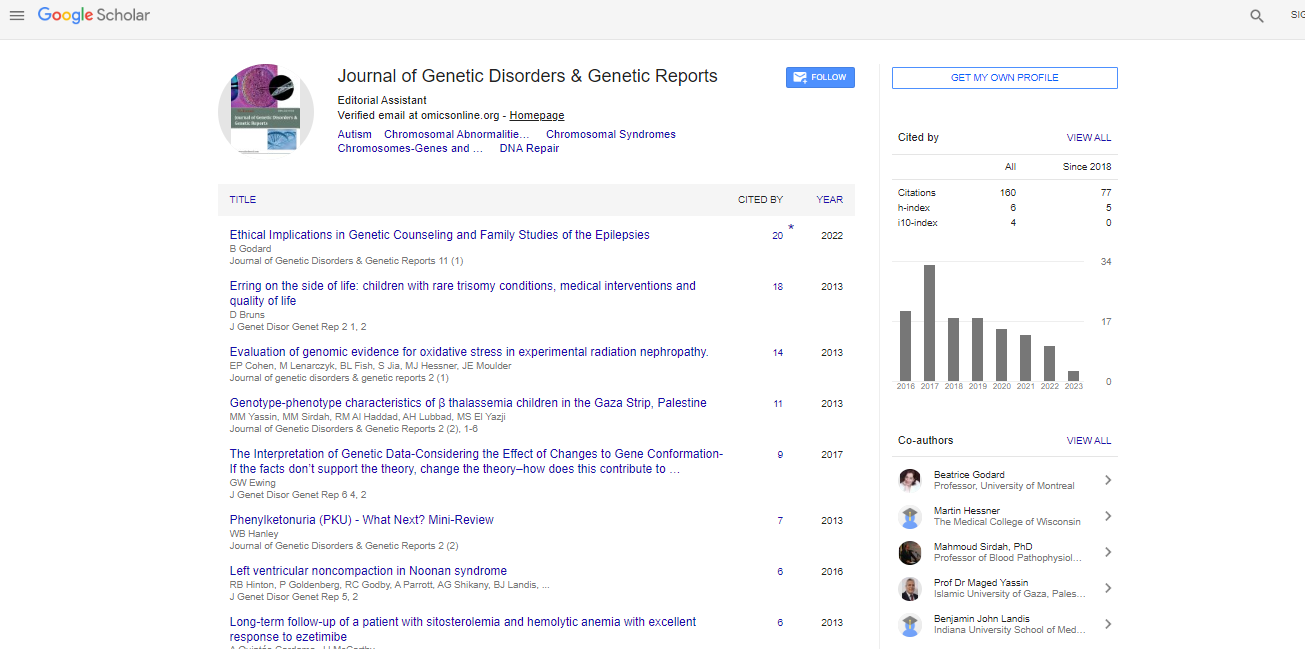Opinion Article, J Genet Disor Genet Rep Vol: 12 Issue: 3
Edwards Syndrome: A Genetic Disorder with Profound Impacts
Osaka Akiyama*
1Department of Statistical Genetics, Osaka University , Osaka, Japan
*Corresponding Author: Osaka Akiyama,
Department of Statistical Genetics,
Osaka University , Osaka, Japan
E-mail: akiyamaosaka@gmail.com
Received date: 15 May, 2023, Manuscript No JGDGR-23-106031;
Editor assigned date: 17 May, 2023, PreQC No JGDGR-23-106031 (PQ);
Reviewed date: 01 June, 2023, QC No JGDGR-23-106031;
Revised date: 08 June, 2023, Manuscript No JGDGR-23-106031 (R);
Published date: 16 June, 2023, DOI: 10.4172/2576-1439.1000211
Citation: Akiyama O (2023) Edwards Syndrome: A Genetic Disorder with Profound Impacts. J Genet Disor Genet Rep 12:3.
Abstract
Description
Edwards syndrome is also known as Trisomy 18, it is a genetic disorder caused by the presence of an extra copy of chromosome 18 in every cell of the body. This condition leads to developmental abnormalities and can significantly impact an individual's health and quality of life. Trisomy 18 is a rare chromosomal disorder with severe medical complications. In this article, we will explore the characteristics, symptoms, prognosis, and challenges associated with Trisomy 18, shedding light on the complexities of this genetic condition.
Trisomy 18 occurs when there are three copies of chromosome 18 instead of the typical two copies. This additional chromosome disrupts normal development and results in multiple physical and intellectual abnormalities. Trisomy 18 is caused by a spontaneous error during the formation of reproductive cells or early embryonic development. The presence of an extra chromosome 18 in every cell affects various organ systems and leads to a range of medical complications.
Symptoms and medical complications
Trisomy 18 is associated with a multitude of physical and developmental abnormalities. Common symptoms include low birth weight, characteristic facial features (such as small jaw and ears, clenched fists, and overlapping fingers), heart defects, kidney problems, severe intellectual disability, feeding difficulties, and musculoskeletal abnormalities. Individuals with Trisomy 18 often experience growth and developmental delays, have a high risk of respiratory infections, and may develop life-threatening complications such as heart failure.
Prognosis and management
The prognosis for Trisomy 18 is generally poor, with a majority of affected individuals experiencing significant medical challenges and reduced life expectancy. Many infants with Trisomy 18 do not survive beyond the first year of life, and those who do often face ongoing health issues and developmental limitations. The management of Trisomy 18 involves providing supportive care, addressing individual symptoms and complications, and improving quality of life. A multidisciplinary approach involving healthcare professionals, specialized therapies, and family support is crucial in managing the complex needs of individuals with Trisomy 18.
Research and awareness
Ongoing research efforts seek to deepen our understanding of Trisomy 18, exploring the genetic mechanisms underlying the condition and potential therapeutic interventions. Advances in prenatal screening and diagnostic techniques, such as Non-Invasive Prenatal Testing (NIPT) and chromosomal microarray analysis, contribute to earlier and more accurate diagnoses. Increased awareness and understanding of Trisomy 18 are essential for fostering support networks, promoting research, and advocating for improved care and resources for affected individuals and their families.
Ethical considerations
Ethical considerations play a significant role in the management of Trisomy 18. Decisions regarding medical interventions, treatment plans, and end-of-life care require careful consideration, taking into account the best interests and quality of life of the affected individuals. Open and honest communication, respect for individual values and preferences, and support for families' emotional well-being are addressing the ethical complexities associated with Trisomy 18.
Conclusion
Trisomy 18 is a challenging genetic disorder characterized by a range of physical and developmental abnormalities. Understanding the symptoms, medical complications, prognosis, and impact on individuals and families is essential for providing appropriate care and support. Ongoing research, increased awareness, and compassionate care contribute to improved outcomes and enhanced quality of life for individuals with Trisomy 18. By fostering greater understanding and support, we can strive towards enhancing the lives of those affected by this complex genetic condition.
 Spanish
Spanish  Chinese
Chinese  Russian
Russian  German
German  French
French  Japanese
Japanese  Portuguese
Portuguese  Hindi
Hindi 



